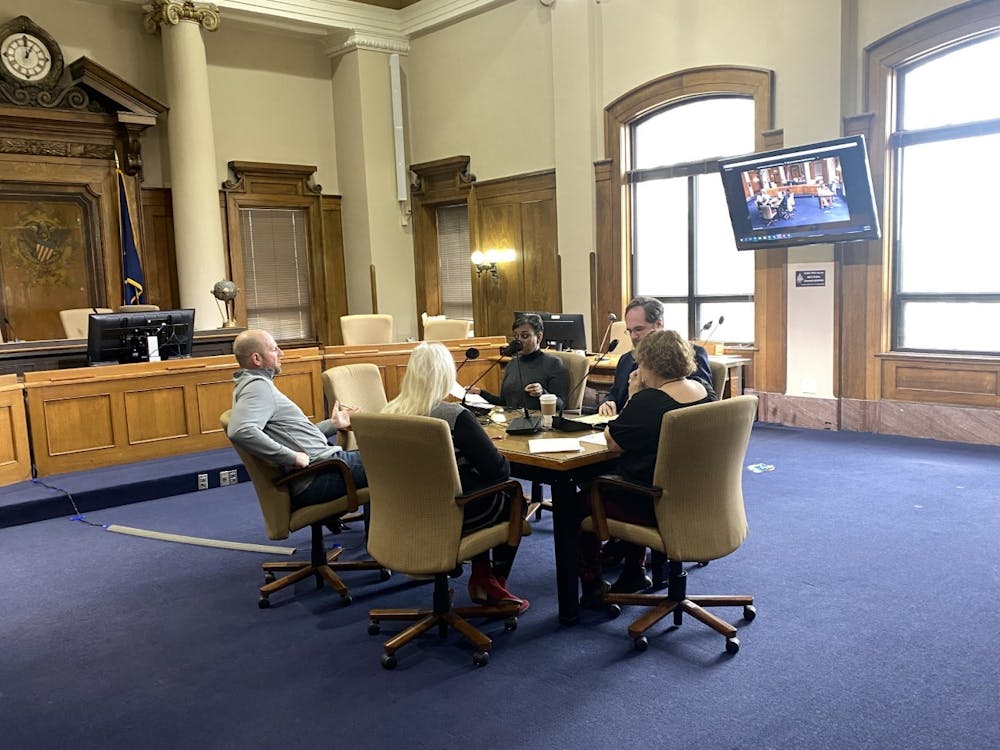At its second meeting on Thursday looking into Bloomington City Council candidate and IU student David Wolfe Bender’s residency, the Monroe County Election Board read aloud an email from Bender’s attorney announcing an intent to withdraw from the race, although the board decided to continue its investigation. The board also determined specific parts of Indiana code to include in their notice to Bender.
Bender filed to run earlier this year for the city council’s District 6, which mostly represents students. However, residents at the address listed on his candidate filing form and voter registration told the IDS he does not live there.
A complaint by the vice chair of the Monroe County Republicans, William Ellis, brought the matter to the election board last week, which revealed further evidence that Bender may not live at the address.
The meeting began with a discussion of which parts of Indiana code to include in their notice to Bender.
The first was Indiana code 3-5-5-2, which has to do with establishing residency. The section mentions that residency can be established by an individual’s origin or birth, intent and conduct taken to establish residence and operation of law.
The second was Indiana code 3-8-1-27, particularly the subsection that requires a city council candidate to reside in the district where they are seeking election for six months prior to the election.
The third was Indiana code 3-14-1-1, particularly the subsection that says a person who knowingly files a declaration of candidacy with false information commits a Class A misdemeanor.
Donavan Garletts, the Republican member of the board, asked if the board should also investigate a potential violation of election law concerning voter registration. Monroe County Democratic Chair David Henry disagreed since the complaint filed by Ellis was focused on Bender’s declaration of candidacy, not specifically his voter registration.
Garletts made a motion to add Indiana code 8-1-1, which said a person is not qualified to run for office unless the person is registered to vote in the district the person desires to represent.
The vote passed 2-1, with Henry voting no.
After the aspects of Indiana code in question were determined, Monroe County Clerk Nicole Browne read an email from an attorney speaking on behalf of Bender into the record.
The email said Bender intended to withdraw his candidacy after the primary election since he cannot legally withdraw at this point before the primary. Bender’s lawyer also asked the board in the email to confirm Bender’s withdrawal and confirm they will not continue to pursue an investigation.
“David wanted to run to help his community, but since the Republican Party signaled it would pursue a challenge to David’s candidacy, that distraction would take away from the good David aimed to do. He needs to focus on his studies and will find other ways to help the city,” Browne read from the email.
The email drew mixed reactions from the board, with Henry suggesting the hearing to investigate Bender’s residency be moved until after the primary election.
“He’s trying to rectify a process and do what’s right,” Henry said.
Browne disagreed, saying Bender had a window of time after the publication of the IDS’s investigation into his residency and before the first election board meeting to acknowledge that there was a mistake. She also said ensuring the legitimacy of candidates and elections is especially critical following the 2020 national elections.
“The optics here are not good,” she said. “I feel that we would be doing Monroe County a disservice to not pursue this.”
Browne also expressed the fear of setting a precedent for a candidate to lie about their residency and be able to withdraw from the race to avoid consequences if this issue is not pursued.
[Related: Monroe County Election Board to investigate city council candidate David Wolfe Bender’s residency]
Garletts echoed Browne’s concerns.
“I think we are at an incredibly important time in elections and what the public views as integrity of elections,” he said.
Henry said he was concerned the board would not have time to deal with the investigation during the primary elections season, which begins with early voting on April 4. This prompted a question from Garletts of what the term “expeditiously” entailed, and whether or not postponing the hearing until after the primary would violate the spirit of the term. The term refers to Indiana code 3-5-6-31, which provides guidelines for how suspected election violations are supposed to be investigated.
The board decided to meet again at 1 p.m. on March 23. Henry said he appreciated that the board was meeting to discuss the investigation publicly.
“It is vital that this conversation happens in a public forum,” Henry said.
Browne also expressed confidence that the board is doing its job to ensure fairness in elections.
“We will come out on the other side, and Monroe County will be better for it,” she said.
Bender was not immediately available for a comment.
Editor's Note: Bender was previously employed by the Indiana Daily Student.




